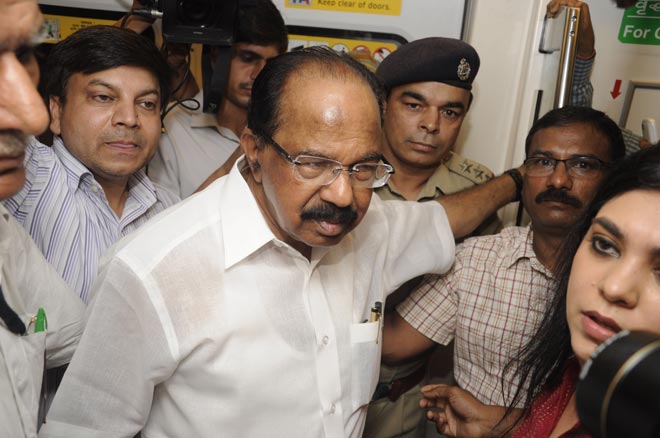New Delhi: Union Oil Minister Verappa Moily’s much-talked-about Metro ride on Wednesday has evoked a mixed response from the people in the street and on social media. A section of the media as well as people were critical of Moily’s Metro ride during peak hours which caused unspeakable misery to the daily commuters and urged the government to move beyond acts of tokenism.
Keeping the promise that he had made a month ago, Moily took the Metro to work on Wednesday as part of his drive to save fuel. The Minister said he hoped that this ‘humble beginning’ would inspire others and start a movement. Foregoing his government car, the minister took a short walk from his Tughlak Road residence to the Race Course Metro station and boarded a train to Central Secretariat station from where he walked to his Shastri Bhavan office.
Union Oil Minister Veerappa Moily during his maiden Metro ride on Wednesday.
However, Moily was followed by a long line of news reporters from the moment he stepped out of his house. The CISF, which provides security for the Delhi Metro, had to form a protective cordon around him as everyone jostled to get on the same coach as the minister.
While the way the well-intentioned move unfolded was not right and it caused a lot of misery to the commuters, it did something unique: it brought the high and mighty down from the corridors of powers to the jam-packed coaches of the common man. Everything else – the timing, the security cordon – can be bettered if the intention is there and the trend picks up so fast that it becomes a compulsion for others.
As for the critics of tokenism, let us not underestimate its power. Every attempt to bring in real equality can be brushed off thus. Because the wedge that divides us from them is vast, we cannot let it be. Why do you think that front seat in state roadways buses is still marked as reserved for MPs/MLAs? Because certain decades ago, MPs/MLAs travelled like us. Not even that, a certain more decades ago, they travelled in third class (what’s now called the General class) compartments of trains.
And all this began with the lifestyle of a man. It was famously said of Mahatma Gandhi that it costs a great deal of money to keep him living in poverty. This could very well be called tokenism. Since the Mahatma himself led a lifestyle starkly different from one he adopted after returning from South Africa. But then this tokenism became the totem of our freedom struggle and the trend continued for many years even after Independence.
It didn’t happen on a specific date but then a gulf began to form between us and them. Privileges became entitlements and exceptions became rules. Longer motorcades, larger retinues and thicker security cordons became their identities. Today, a Member of Parliament in a public transport is rare, let alone ministers. The withdrawal of security from a political leader is perceived as a loss of status. As for the red beacons atop cars, the Supreme Court has been fighting a long battle on that front.
On August 19, 2013, a bench of justices GS Singhvi and V Gopala Gowda questioned why these facilities are given to ministers, bureaucrats and politicians when P Chidambaram had refused to have them when he was the Home Minister. The Supreme Court asked the Centre and states to remove the sirens from vehicles of VIPs as it is in violation of the law and indicated that it would pass a direction to prevent misuse of red beacon also, observing that their use was a “reflection of British Raj”.
What Moily did on Wednesday could certainly be done in a much better way. He could change his travel time so as to avoid peak hour rush. He can cut down on his security cordon. Most security threats are perceived and exaggerated to add more personnel to one’s cover. A single political leader having 100 securitymen at his/her disposal would not make sense under any circumstances. By the way, former Uttar Pradesh Chief Minister Mayawatis 600-strong security cover was reduced after a change of guard in the state in March 2012. She is now entitled to Z-Plus security which includes 28 National Security Guard commandos and 15 Cobra commandos. A deputy Superintendent officer of the Uttar Pradesh police supervises her commandos and the 12 homeguards, who are also a part of her entourage.
Moily’s gesture looks grotesque because of the improbability of such events. But such tokenism if done regularly and properly might be a game-changer. It will not win any elections for anyone. But it will win hearts and might bring about a change of image in people’s mind for the political leadership.

